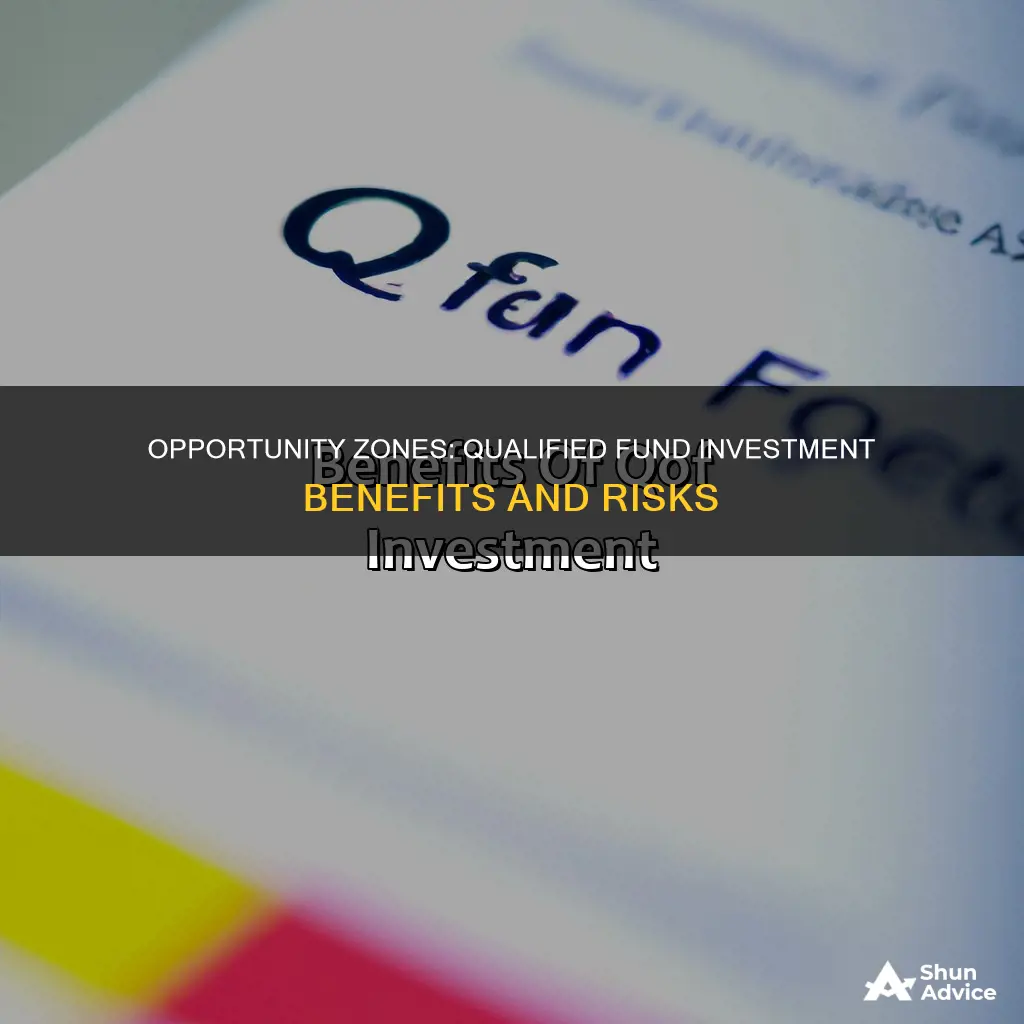
Qualified Opportunity Funds (QOFs) are investment vehicles that aim to drive business and real estate investments towards low-income or economically distressed areas of the United States. The federal government incentivizes investors to put money into these funds by offering tax breaks on capital gains. Investors can reinvest any realized capital gains into these funds to defer taxes and, ultimately, reduce their tax bill.
QOFs were established as part of the 2017 Tax Cuts and Jobs Act to encourage investment in underfunded, low-income, and distressed communities. These funds facilitate investments in opportunity zones, which are regions identified as experiencing economic hardship and in need of stimulus.
There are two main tax benefits of investing in QOFs:
1. Deferral of capital gains taxes until 2026
2. Reduction of capital gains tax liability based on the length of investment
However, there are several rules and caveats to keep in mind, and the specific rules and regulations for investment in, and taxation of, QOFs could be subject to change.
| Characteristics | Values |
|---|---|
| Purpose | Drive business and real estate investments toward low-income or economically distressed areas of the country |
| Tax benefits | Defer and reduce capital gains tax liability |
| Investment options | Single-asset or multi-asset funds that invest in a collection of properties or businesses, often spread across different asset classes or geographies |
| Investor requirements | In some cases, investors need to be accredited, earning at least $200,000 in each of the past two years ($300,000 with a spouse) and having a net worth of at least $1 million in investable assets |
| Eligible gains | Capital gains or qualified 1231 gains (gains on certain types of business properties) recognized for federal income tax purposes before January 1, 2027 |
| Investment timing | Reinvest eligible gains into a qualified opportunity fund within 180 days from when the gain would be recognized |
| Tax deferral deadline | December 31, 2026 |
| Tax basis adjustments | 10% increase in basis after 5 years, additional 5% increase after 7 years, no capital gains tax on appreciation after 10 years |
What You'll Learn
- What are the tax benefits of investing in a Qualified Opportunity Fund?
- What are the requirements for a Qualified Opportunity Fund?
- What are the risks of investing in a Qualified Opportunity Fund?
- How do I start investing in a Qualified Opportunity Fund?
- What are the potential returns of investing in a Qualified Opportunity Fund?

What are the tax benefits of investing in a Qualified Opportunity Fund?
Qualified Opportunity Funds (QOFs) are investment vehicles designed to invest in real estate or business development in economically distressed areas known as "opportunity zones". These funds arose from the 2017 Tax Cuts and Jobs Act (TCJA) to encourage investment in underfunded, low-income, and distressed communities.
There are several tax benefits to investing in a QOF, including:
Deferral
Investors can defer their tax payments on prior investment gains if those gains are then invested in a QOF within 180 days of the sale. Taxes are then deferred to either the day when the QOF investment is sold or exchanged, or December 31, 2026 — whichever comes first.
Discount
If a QOF investment is held for longer than five years, investors receive a 10% exclusion of the deferred gain on their investment. If held for more than seven years, a 15% exclusion is applied.
Exemption
If a QOF investment is held for at least 10 years, investors may be able to permanently exclude gain resulting from a qualifying investment when it is sold or exchanged. This means that investors do not owe federal income taxes on the fund's appreciation by the date of sale.
A Guide to Investing in Mutual Funds via Zerodha
You may want to see also

What are the requirements for a Qualified Opportunity Fund?
A Qualified Opportunity Fund (QOF) is an investment vehicle that files either a partnership or corporate federal income tax return. It is organised for the purpose of investing in Qualified Opportunity Zone (QOZ) property. To become a QOF, an eligible corporation or partnership must self-certify by annually filing Form 8996 with its federal income tax return.
To qualify and maintain its status, a QOF must:
- File a federal income tax return as a partnership, corporation, or LLC that is treated as a partnership or corporation.
- Be organised for the purpose of investing in Qualified Opportunity Zone property under the laws in one of the 50 states, the District of Columbia, a U.S. possession, or a federally recognised Indian tribal government.
- Hold 90% of its assets in Qualified Opportunity Zone property.
To maintain its status, the entity must annually file Form 8996, Qualified Opportunity Fund, with the eligible partnership or corporation federal tax return.
A QOZ is an economically distressed community where new investments, under certain conditions, may be eligible for preferential tax treatment. Localities qualify as QOZs if they were nominated for that designation by a state, the District of Columbia, or a U.S. territory. This nomination must be certified by the Secretary of the U.S. Treasury via the Internal Revenue Service (IRS).
QOZs were added to the tax code by the Tax Cuts and Jobs Act on December 22, 2017. They were established to encourage investment in underfunded, low-income, and distressed communities.
QOZ property is a QOF's qualifying ownership interest in a corporation or partnership that operates a QOZ business in a QOZ or certain tangible property of the QOF that is used in a business in the QOZ.
To be a qualifying ownership interest in a corporation or partnership, the interest must be acquired after December 31, 2017, solely in exchange for cash; the corporation or partnership must be a QOZ business; and for 90% of the holding period of that interest, the corporation or partnership was a QOZ business.
A QOZ business must earn at least 50% of its gross income from business activities within a QOZ.
Real Estate Funds vs. Buying a House: What's the Difference?
You may want to see also

What are the risks of investing in a Qualified Opportunity Fund?
Investing in a Qualified Opportunity Fund (QOF) may involve risks similar to those associated with other types of investments, such as market loss, liquidity risk, and business risk. It is important to note that this type of investment may not be suitable for everyone, so consulting with an investment advisor beforehand is recommended to determine if it aligns with your risk profile and investment diversification strategy.
One key risk to consider is the potential for loss in value. While Qualified Opportunity Funds offer the possibility of increasing your investment value over time, there is also a chance that the fund's performance may result in a decrease in value. This means that you could lose a portion of your initial investment.
Another risk to keep in mind is liquidity risk. Qualified Opportunity Funds typically involve investing in real estate or business development projects, which may not provide immediate liquidity. It may take time to convert your investment back into cash, and there is no guarantee that you will be able to sell your investment quickly or at a desired price.
Additionally, business risk is inherent in any investment, including Qualified Opportunity Funds. The success of the fund depends on the performance and management of the underlying businesses or real estate ventures. There is a chance that the businesses or ventures may not perform as expected, leading to potential losses.
Furthermore, Qualified Opportunity Funds have specific requirements and regulations that must be met to maintain their status and receive tax benefits. Failure to comply with these rules could result in losing the associated tax advantages or even facing penalties.
Lastly, it is important to remember that tax laws and regulations can change over time. The specific rules and benefits associated with Qualified Opportunity Funds may be subject to future modifications, which could impact the overall risk and return profile of your investment. Therefore, it is always advisable to stay informed about any changes in tax legislation that may affect your investment decisions and outcomes.
Mutual Funds: Smart Investment or Risky Business?
You may want to see also

How do I start investing in a Qualified Opportunity Fund?
To start investing in a Qualified Opportunity Fund (QOF), you must first understand the requirements and tax implications. QOFs are investment vehicles designed to drive business and real estate investments towards low-income or economically distressed areas. The federal government offers preferential tax treatment on capital gains to incentivize investors.
- Understand the Requirements: QOFs must meet specific criteria to qualify for tax benefits. They must be organized as corporations or partnerships and file IRS Form 8996 annually to elect to be taxed as a QOF. Additionally, QOFs must invest at least 90% of their assets in Qualified Opportunity Zone Property, which includes investing in Qualified Opportunity Zone Businesses or purchasing and improving tangible property within Opportunity Zones.
- Consult with Professionals: Before investing, it is essential to consult tax and financial advisors who are well-versed in QOFs. They can guide you through the rules, implications, and necessary paperwork. This step is crucial to ensuring you make a fully informed decision.
- Identify Eligible Gains: To take advantage of tax benefits, you must reinvest eligible gains into a QOF within 180 days of realizing the gain. Eligible gains include capital gains and qualified 1231 gains recognized for federal income tax purposes before January 1, 2027, and not from transactions with related persons.
- Choose Your Investment Vehicle: You can choose to invest in a single-asset opportunity or multi-asset funds that invest in a collection of properties or businesses across different geographies. It is important to conduct due diligence by examining the assets within the fund, the management team, investment strategy, and potential returns.
- Consider the Tax Benefits: One of the main advantages of investing in QOFs is the potential for significant tax savings. By reinvesting capital gains, you can defer and reduce your capital gains tax liability. The longer you hold your investment, the greater the tax benefit. After holding for 5 years, your cost basis increases by 10%, excluding you from paying taxes on 10% of your realized capital gain. After 7 years, your basis increases by an additional 5%, resulting in a 15% exclusion. If you hold your investment beyond 10 years, you will owe no capital gains tax on any additional appreciation.
- Monitor and Comply: Investing in QOFs requires ongoing due diligence and compliance with regulations. It is important to stay informed about any changes in rules and regulations and ensure that your investments continue to meet the requirements for tax benefits.
By following these steps, you can begin investing in Qualified Opportunity Funds while also contributing to the revitalization of distressed communities.
Best Index Funds to Invest in India: A Guide
You may want to see also

What are the potential returns of investing in a Qualified Opportunity Fund?
Qualified Opportunity Funds (QOFs) are investment vehicles designed to invest in real estate or business development in economically distressed areas known as "opportunity zones". These zones are designated by the state and certified by the secretary of the US Treasury via the Internal Revenue Service (IRS).
There are several potential returns of investing in a Qualified Opportunity Fund:
Tax Deferral and Reduction
Investors can defer their tax payments on prior investment gains if those gains are then invested in a qualified opportunity fund within 180 days after the sale. Taxes are then deferred to either the day when the opportunity fund investment is sold or exchanged, or December 31, 2026 — whichever comes first.
Tax Basis Step-Up
The longer a participant holds their qualified opportunity fund investment, the smaller their tax burden may be. If held for longer than five years, investors receive a 10% exclusion of the deferred gain on their investment. If an investor holds for more than seven years, they receive a 15% exclusion.
No Tax on Appreciation
If an investor holds their investment in the Qualified Opportunity Fund for at least 10 years, they may be able to permanently exclude gain resulting from a qualifying investment when it is sold or exchanged. This means that the investor does not owe federal income taxes on the fund's appreciation by the date of sale.
Best Investment Funds: Where to Invest Your Money
You may want to see also







